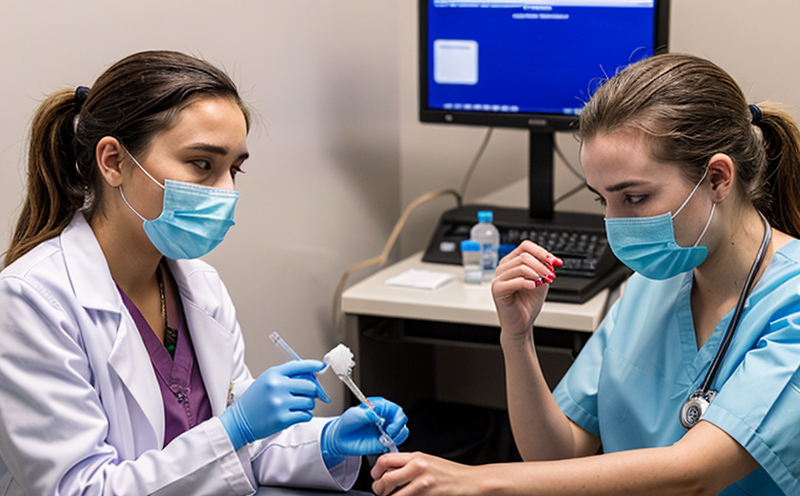EN ISO 15190 Safety Testing in Clinical Microbiology Labs
The CEN standard EN ISO 15190:2016 sets the safety requirements and performance criteria for clinical microbiology laboratories. This internationally recognized norm is crucial to ensure that testing processes are conducted under safe conditions, thereby safeguarding healthcare workers and patients alike.
The scope of this standard primarily involves evaluating biological safety cabinets (BSCs), incubators, and other essential equipment used in microbiological testing. It includes stringent requirements for the design, construction, installation, operation, and maintenance of these instruments to minimize risks associated with infectious agents.
A key aspect of EN ISO 15190 is its emphasis on hazard identification and risk assessment. Laboratories must identify potential hazards within their operations that could lead to accidents or occupational health risks. The standard provides a framework for assessing these risks, including the possibility of cross-contamination between samples, proper handling of infectious materials, and appropriate disposal methods.
The testing process under EN ISO 15190 involves several stages:
- Initial setup and calibration of safety equipment
- Periodic inspections to ensure compliance with safety standards
- Performance validation tests to verify the efficacy of safety measures
- Routine monitoring for any signs of deterioration in safety features
Compliance with this standard is not merely a regulatory requirement but also a best practice that enhances laboratory efficiency and reliability. By adhering to EN ISO 15190, laboratories can ensure they meet the highest safety standards, which translates into better patient care and more accurate test results.
The implementation of this standard requires a multidisciplinary approach involving microbiologists, engineers, and risk management professionals. It involves ongoing education for staff on safe handling practices and regular updates to protocols as new risks are identified or technological advancements are made.
In conclusion, EN ISO 15190 is essential for maintaining the integrity of clinical microbiology laboratories. By focusing on safety, it ensures that laboratories can operate efficiently while minimizing risks to personnel and patients. This standard plays a pivotal role in fostering trust within healthcare systems by demonstrating a commitment to quality and patient safety.
Why Choose This Test
Selecting EN ISO 15190 for your clinical microbiology testing is advantageous for several reasons. Firstly, it aligns with global best practices in laboratory safety, which enhances the credibility of your operations both locally and internationally.
- Global Recognition: Compliance with this standard ensures that your laboratories meet international standards recognized by healthcare authorities worldwide.
- Patient Safety: By adhering to strict safety protocols, you minimize the risk of contamination and cross-infection within your facility.
- Operational Efficiency: Regular testing under EN ISO 15190 helps identify potential equipment failures early, reducing downtime and ensuring continuous service.
Secondly, this standard provides a structured approach to risk management that can be integrated into existing quality management systems. This integration ensures that all aspects of laboratory operations are consistently monitored for safety and efficiency.
The third benefit is the enhanced reputation it brings to your organization. Demonstrating compliance with EN ISO 15190 can significantly boost your standing among healthcare providers, insurance companies, and regulatory bodies.
Lastly, by choosing this testing method, you contribute to a culture of continuous improvement within your laboratory. This approach fosters innovation and adaptability, enabling you to stay ahead in an ever-evolving field.
Customer Impact and Satisfaction
The impact of EN ISO 15190 on customer satisfaction is profound. By ensuring that all safety protocols are met, your laboratory demonstrates a commitment to excellence that resonates with healthcare providers, patients, and regulatory bodies.
- Patient Trust: Patients feel reassured knowing their samples are handled safely and securely.
- Provider Confidence: Healthcare providers can trust the accuracy and reliability of test results from your laboratory.
- Regulatory Compliance: Adherence to international standards ensures that all regulatory requirements are met, enhancing compliance and reducing potential penalties.
In terms of operational efficiency, EN ISO 15190 helps streamline processes by identifying and addressing safety concerns proactively. This not only improves day-to-day operations but also enhances the reputation of your laboratory as a dependable partner in healthcare delivery.
The standard's emphasis on continuous improvement and risk management contributes to long-term customer satisfaction. By maintaining high standards, you ensure that your services remain relevant and effective over time.
Environmental and Sustainability Contributions
Adhering to EN ISO 15190 extends beyond safety measures; it also contributes positively to the environment. The standard promotes sustainable practices by encouraging efficient use of resources, reducing waste, and minimizing the environmental footprint of laboratory operations.
- Eco-Friendly Practices: By ensuring that all instruments are properly maintained and calibrated, the risk of waste generation is minimized.
- Resource Efficiency: The standard encourages the use of energy-efficient equipment, which reduces overall energy consumption in laboratories.
- Waste Management: Proper disposal methods for hazardous materials contribute to a cleaner environment by preventing pollution and contamination.
The implementation of these sustainable practices not only benefits your laboratory but also supports broader environmental goals. By being proactive in reducing waste and conserving resources, you play a vital role in promoting sustainability within the healthcare sector.





